Program Information
The purpose of the Marine and Estuarine Science program (MESP) is to provide a coherent program of study in coastal marine and estuarine sciences at the M.S. level. This program focuses resources of existing Master's programs in the College of the Environment and the Department of Biology. It is a research-oriented program in the marine and estuarine sciences. Human impact on coastal marine and estuarine systems cannot be properly evaluated without a scientific understanding of their fundamental physical, chemical, and biological processes.
Goals
The goal of the MESP is to produce specialists qualified to study fundamental features of these systems and the relationship between natural processes and perturbations from human activity. Graduates will be qualified for entry-level positions in the profession and will be competitive in pursuit of the doctorate.

Shannon Point Marine Center
Western’s marine research facility, Shannon Point Marine Center, sits on a wooded 78-acre campus on the Salish Sea in Anacortes. Faculty and students conduct marine research here on a wide assortment of topics, from microbial evolution to studies of mammals and seabirds. Graduate students may also take advantage of the scientific diving center, two academic research vessels, indoor sea tables with water pumped from Guemes Channel, and laboratories devoted to marine molecular ecology, marine chemistry, ocean acidification, and marine science instruction.
Application Requirements
- All applicants must complete the Graduate School's ApplyWeb application and pay the $100 application fee.
- Within the application you will be prompted to upload an unofficial transcript from each institution attended. If admitted, you will be asked to provide official transcripts.
- Additional application materials are specified below. Applications will not be forwarded to the department for review until all required materials have been received by the Graduate School.
- International Applicants: Please review the requirements for information regarding Degree Equivalency, English Language Proficiency and student VISA requirements.
The Marine and Estuarine Science Program (MESP) is a specialization within the Environmental Science and Biology programs, and it is jointly offered by the Dept of Biology, College of the Environment, and Shannon Point Marine Center. Please see the MESP program website for differences in program requirements for MESP specialization in Biology versus Environmental Science.
Additional Application Requirements
- Three (3) Letters of Reference
- Statement of Purpose: The statement of purpose is a chance to show who you are beyond what is contained in your transcripts. Reviewers will use it to evaluate your experience, goals, motivation, enthusiasm, and research interests. Your statement gives you an opportunity to explain anything in your “data” that may be unclear to the reader. You can highlight your strong points, particularly if they are not adequately expressed in your other materials. You can also discuss weaknesses in your record. This isn’t a chance to make excuses; instead, candidly discuss any extenuating circumstances that may help the reviewer to understand your background. Your statement will be read by a review committee and by potential faculty advisers. Be sure to give some indication of the topic(s) you wish to pursue in graduate school and what adviser(s) you would like to work with. Your application will be stronger if you have actually communicated with those individuals beforehand and know that they are accepting students. You do not have to know your precise thesis topic; it is good to be flexible. However, it is inadequate to simply state that you like the oceans. Advisers like applicants who have thought about their future, know something about the field, and have developed their own interests. There is no set length for the statement of purpose. Half a page is too short; 4 pages is probably too long. Make sure the statement is well written, as reviewers will use it to assess your writing ability. Use good structure and vigorously edit out grammatical errors, spelling mistakes and typos. It generally helps to have someone else (a friend, colleague, or professor) read and critique the statement.
